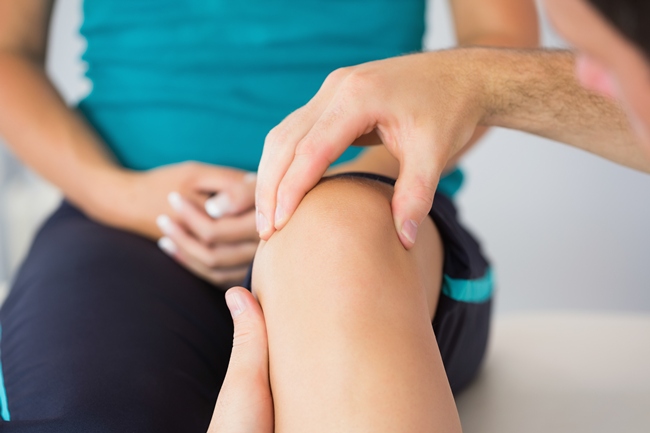If you’ve ever felt a twinge of pain in your knee when getting out of a chair, you’re not alone. Nearly 30 percent of Americans regularly experience pain in their knees.
Knee pain, which occurs in people of all ages, has a variety of causes, including injuries, anatomical problems and arthritis. Some common sources of knee pain include ligament or meniscus tears, sprains, and tendonitis, which often results from overuse.
Whether your knee pain is the result of too much “Weekend Warrior” activity or a chronic, recurring issue, we answer 3 common questions you might have below.
Q: Can I treat my pain at home?
A: It depends on what symptoms you’re experiencing and how severe they are. If you’re suffering from minor knee discomfort after a workout, you may be able to alleviate your pain with the R.I.C.E. method — rest, ice, compression and elevation. However, some symptoms merit medical attention to determine the cause.
“If you experience significant swelling or the knee locks or isn’t weight-bearing, those are signs you should seek medical attention,” says Bill Moore Smith, M.D., medical director of UT Erlanger Primary Care and UT Erlanger Sports Medicine and head team physician for the University of Tennessee at Chattanooga. “Pain that doesn’t go away or worsens is also a sign that medical care is needed.”
Q: Is nonsurgical treatment available?
A: Yes, a variety of noninvasive methods are available for the treatment of knee pain. In fact, many conditions and injuries can be treated without requiring surgery.
“Most knee pain can be resolved with rest, exercise, physical therapy, bracing and medication injections,” Dr. Smith says. “If the condition doesn’t respond to conservative methods, then an MRI is usually warranted to help determine if the problem can be treated surgically.”
Q: Am I a candidate for knee replacement?
A: According to the Agency for Healthcare Research and Quality, more than 600,000 knee replacements are performed each year in the United States. How can you know if you’re a candidate?
The American Academy of Orthopedic Surgeons indicates that good candidates for knee replacement may experience:
• Severe knee pain or stiffness that limits daily activities such as walking or climbing stairs
• Moderate or severe knee pain while resting
• Chronic knee inflammation and swelling not resolved by rest, oral medications or injections
• Knee deformity
• Failure to improve with nonsurgical treatments
If you experience any of the items listed above, speak with your physician about whether knee replacement might be a solution for your pain.
Knee replacement removes damaged cartilage and a small portion of bone with mostly metal components that mimic the surface of the joint. Most patients who undergo knee replacement experience significant pain relief and improved quality of life after completing physical rehabilitation.
Erlanger Orthopaedics offers comprehensive orthopaedic and sports medicine services, including joint replacement. Find a physician who can help evaluate your knee pain and offer a treatment plan.







